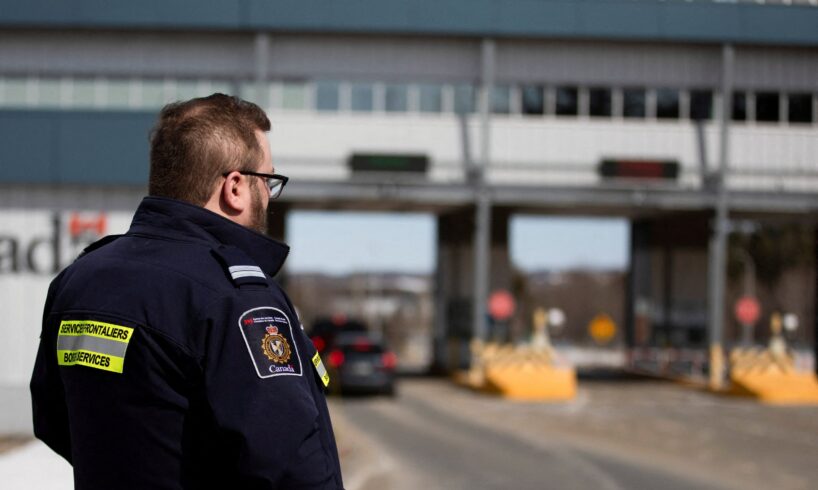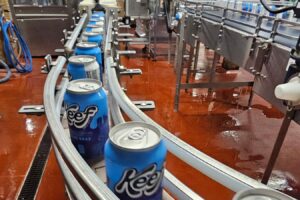
Open this photo in gallery:
The Canada Border Services Agency says it arrested and charged three alleged smugglers after police intercepted a truck carrying 44 Haitian nationals in Stanstead, Que.Evan Buhler/Reuters
Canadian authorities intercepted a 16-foot U-Haul truck at the U.S.-Canada border near Stanstead, Que., just minutes after alleged smugglers loaded in 44 people, the RCMP say.
The people found in the sweltering cargo area, most of whom were Haitian nationals, included a pregnant woman and young children, police said. They allegedly told officers they had crossed the border on foot, walking for two hours before the truck picked them up.
The interception occurred against the backdrop of a sweeping immigration crackdown south of the border, with a particular focus on protections for Haitians. This has prompted concerns from refugee advocates that the 44 foreign nationals could be returned to the United States, where they could face detention and deportation.
In recent months, the White House has sought to terminate two programs that provided temporary legal status for Haitians fleeing political instability and violence in their home country.
Almost 600 foreign nationals with criminal records due to be deported are missing, CBSA says
A bilateral refugee pact known as the Safe Third Country Agreement prevents most asylum seekers who pass through the U.S. from claiming protection in Canada, and vice versa.
Melissa Claisse of Welcome Collective, a Montreal-based resource centre for refugee claimants and newcomers, said it has seen a notable increase in Haitian arrivals since the White House policy shift began.
“People are trying to keep themselves and their families safe,” Ms. Claisse said. “If there’s any chance that they might find protection in Canada, we see that people will take the chance.”
Ms. Claisse said the U.S. is “not a safe country for immigrants right now.”
“People are being locked up in horrific conditions. They are deported without due process, without meaningful access to legal representation,” she said.
Corporal Erique Gasse, media-relations officer for the RCMP, said one of the officers who attended the scene on Sunday reported that when he opened the truck’s cargo area, he felt a wave of heat escape the vehicle.
Those who were inside took an audible breath as fresh air entered the enclosure, Cpl. Gasse said.
“It was like an inferno,” he said.
He said the RCMP had received a tip that people would be crossing the border, which led to the interception of the truck. The migrants were heading to another location in Quebec, he said.
Cpl. Gasse said there could have been fatalities had the truck not been intercepted early in its journey.
The alleged smugglers – Ogulcan Mersin, 25, and Dogan Alakus and Firat Yuksek, both 31 – face charges under the Immigration and Refugee Protection Act and the Customs Act for assisting people to enter Canada outside of a designated customs office.
The accused remain in custody pending a court appearance on Wednesday, said Guillaume Bérubé, a spokesperson for the Canada Border Services Agency.
An investigation into the matter is under way, and additional charges may be laid, he added.
CBSA said most of the foreign nationals were transferred to the agency’s refugee processing centre in St-Bernard-de-Lacolle, Que., for immigration examinations.
While the Safe Third Country Agreement imposes restrictions on asylum claims, it contains some exceptions – for example, for people with close relatives in Canada.
More than 79,000 Haitians live in Montreal according to the 2021 census, forming the city’s largest immigrant community.
The CBSA did not respond to questions from The Globe and Mail about how many of the foreign nationals intercepted on Sunday have been granted admission to Canada to claim refugee protection or returned to the U.S. under the Safe Third Country Agreement.
Border bill would create ‘in limbo’ foreign residents, refugee groups say
Earlier this year, the Trump administration ended a humanitarian parole program that granted temporary legal status to more than 500,000 people from four countries, including Haiti.
The administration has also sought to abolish temporary protected status for Haitians. The designation allows migrants from unsafe countries to legally live and work in the U.S.
A U.S. district court recently ordered the designation continue until at least February, 2026. The Department of Homeland Security has said it “vehemently disagrees” with the ruling and is “working to determine next steps.”
Cpl. Gasse said this is the first time he’s heard of this many people trying to cross the border in one group. Usually, he sees a family crossing together, or two or three people crossing at a time. Larger groups trying to cross borders together are more common in parts of Europe, Cpl. Gasse said.
As of July 27, the CBSA has processed 22,237 asylum applications in Canada this year, Mr. Bérubé said. This represents a 46-per-cent decrease from the same period last year, when the agency processed 41,187 asylum applications.
With reports from The Canadian Press





